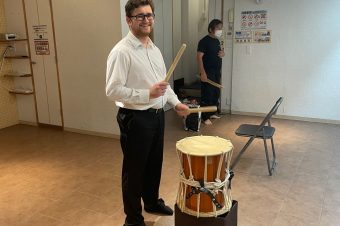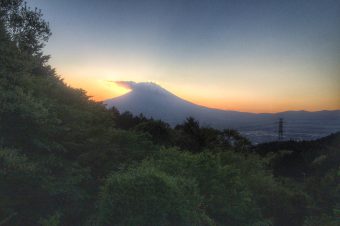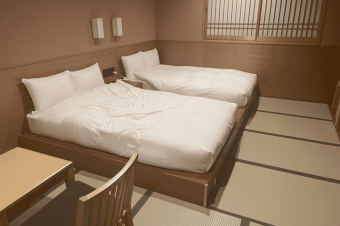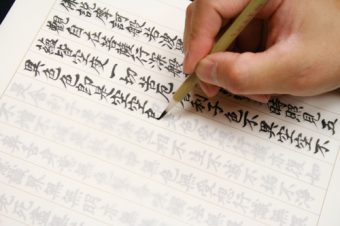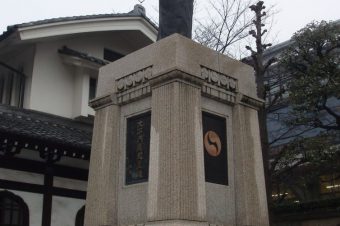Martial arts: the popular image that this phrase conjures is one of sage masters, fast striking action heroes, and disciplined training. Aikido falls into this nebulous and often misunderstood category. One might expect (as I did) that aikido training would be filled with kicks and quick punches. What I found was something entirely different and led me to reflect on the way I approach conflict in general.
I had the opportunity to watch and participate (a little) in an aikido lesson led by a Buddhist monk, Itou Sensei, at Saichuzan Josho-ji in Yokohama. Itou Sensei explained to us what the purpose of studying aikido was and demonstrated some of the techniques used, all while leading his class of members ranging from teens to older than he is.
I was at first surprised to find that aikido does not have any form of striking. The main goal of those practicing aikido is to stop fighting and ensure no one is hurt. Because of this, everything is defensive, and techniques are focused on redirecting the momentum or exploiting pressure points to immobilize the opponent. What is most unique is that any move that you make should be by expending as little energy as possible. In a fight, the first one to tire is often the first one to fall, so aikidoka focus on not using their power and instead channeling or using their attacker’s power against them.

Itou Sensei demonstrated this concept to us by having me push against him as he sat. Without tensing or pushing against me, he could hold me back. Meanwhile I pushed and pushed, tiring myself with little effect. Finally, because all my focus was on pushing in the single direction against him, he could easily exploit my imbalance and make me fall to the side.

It is no coincidence that Itou Sensei is both a Buddhist monk and an aikidoka; the thinking behind aikido is tightly linked with Buddhism. Buddhism emphasizes the interconnectedness between all things, human and nonhuman. In this spirit, one should not look to hurt another. Instead, Itou Sensei stressed that it is important to empathize with your opponent and therefore try to deescalate the situation or at least prevent their injury.
The idea of using opposing power to neutralize the situation, rather than continuing a dichotomous struggle, is also borrowed form Buddhist thinking. He argued that one should take a step back when confrontation presents itself and try to understand the world from a place that is less “black and white”.

For a long time, I have not been religious, but I think that some crucial aspects of Christian thinking have been imbued into me through my days in Sunday school and prevailing American culture. Christianity, and by extension much of western thought, views many things in terms of black and white, hell and heaven, sinner or saint, wrong and right. Through this lens, all the conflicts in the world ranging from international politics all the way down to personal struggles look like good against evil. This way of viewing the world is usually unconscious. I, as with many people, often think of the problems of my life such as breakups, arguments, and failures, in these black and white terms. It is easy to see your own shortcomings as sins or stains, things that must be fought or washed away, in order to achieve some sort of greater self. This idea is even instilled in colloquialisms; in life we “wrestle with demons”, “pull ourselves by our bootstraps”, or as Shakespeare puts it in Hamlet “take arms against a sea of troubles”. It is impossible to escape the idea that we must constantly be opposing the forces of darkness, both outside and within, lest it overcomes us.

Grappling, tensed, white knuckled and shaking, with problems past, present, and future is exhausting. Eventually it breaks us down. It recalls Cyrano de Bergerac’s last stand, sword swinging madly, against the imagined vices of his life. We can divide the world into right and wrong and honorably fight it all our lives, but we can’t win.
This is the subject of one of the lessons I learned with my short experience with aikido: that sort of struggle is unnecessary at best, and counterproductive at worst. Just as tensing against an opponent and fighting their power with your own is sure to leave both sides broken down and maybe hurt, fighting the problems in your life with direct confrontation will often lead to a stalemate. It is best to redirect negative emotions or to avoid them entirely. Meeting angry confrontation with anger will only lead to fights; meeting feelings of self-doubt and guilt by seeking for absolution will only have one grasping for the impossible. Contrasting reality into diametrically opposed sides casts out nuance. It is better to look at things for what they are: gray. Only then can your problems be accurately captured and understood.
Another idea, reflected in aikido, that one should be careful to consider others because of the interconnectedness of man also resonated with me. It brings to mind one of my favorite, often cited, piece of prose by English poet John Donne:
“No man is an island, entire of itself; every man is a piece of the continent, a part of the main. If a clod be washed away by the sea, Europe is the less, as well as if a promontory were, as well as if a manor of thy friend’s or of thine own were: any man’s death diminishes me, because I am involved in mankind, and therefore never send to know for whom the bells tolls; it tolls for thee.”
In essence: no one man is alone, cut off from others in his world. One man’s funeral is all our funerals. In the philosophy of long dead English poets and aikido, we are all in this together. However, I believe this sentiment is largely lost in American culture. Individuality and independence are the foundations of American thinking. Although this undoubtedly has its positives, by cutting ourselves off we risk losing empathy and fostering isolation.
I think that some of the spirit of aikido, and more generally Buddhism, is worth living with. An aikido-ka cannot think of themselves as winning when the other loses. The goal of aikido, and by extension life, is not to overcome others but to understand and cut out the bad parts of yourself. By doing so, the challenges of life can be flipped away.
Not a bad lesson in martial arts.

